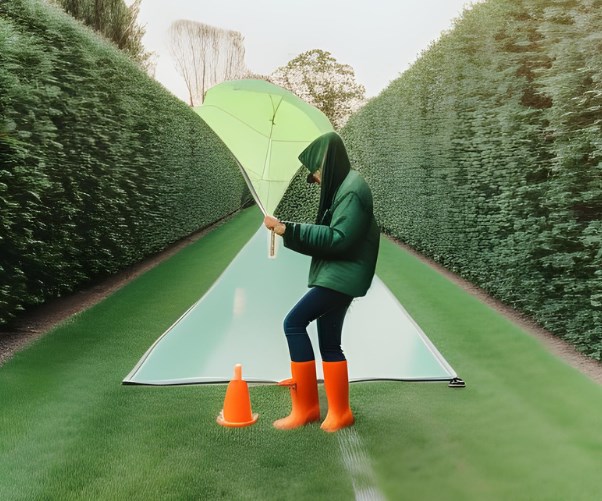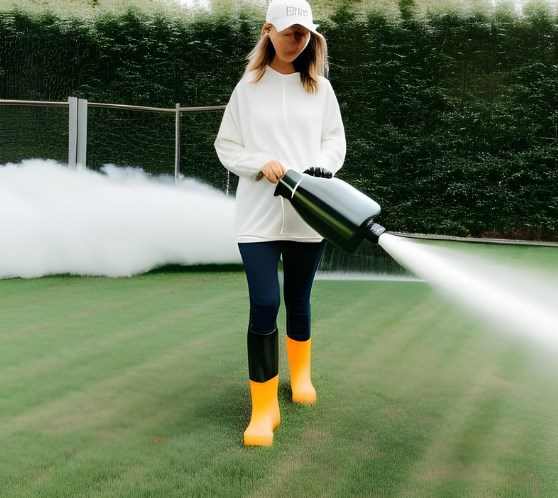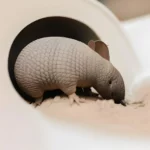Frogs are slimy and hoppy creatures that can be found all over the world. While some people love to watch them jump around, others may want to keep these amphibians away from their homes or gardens. If you’re one of those people who don’t like having frogs around, don’t worry – there are ways to keep them at bay!
One way to keep frogs away is by removing any standing water in your yard or garden. Frogs lay eggs in water, so if you have a pool, pond, or even just a puddle that doesn’t dry up quickly, it could attract more frogs than you’d like. Make sure to drain any containers that collect rainwater as well. By eliminating potential breeding grounds for frogs, you’ll make your property less attractive to them.
Understanding Frog Behavior And Habits
Frogs are interesting creatures that can be found in many different habitats across the world. Understanding their behavior and habits is important when trying to keep them away from your property. One of the most crucial aspects to consider is their breeding patterns, as they tend to congregate near water sources during mating season. If you want to discourage frogs from coming onto your land, it’s essential to remove any standing water or damp areas where they might lay eggs.
Another factor that influences frog behavior is diet preferences. These amphibians are known for eating insects, small fish, and other tiny creatures. If you have a lot of bugs around your yard, this could attract more frogs looking for food. To avoid this situation, try using natural methods like planting certain herbs or flowers that repel pests without harming the environment.
Overall, understanding how frogs behave is key if you’re trying to keep them away from your home or garden. By being aware of their tendencies towards water sources and preferred diets, you can take steps to create an environment that isn’t attractive to them. Next up, we’ll discuss some practical tips for removing standing water and other features that may draw frogs into your space.
Removing Standing Water And Other Attractive Features
To keep frogs away from your property, it is important to remove any standing water or other attractive features that may encourage infestations. By doing so, you can prevent these amphibians from making themselves at home on your premises.
Regular maintenance of your yard and surrounding areas is key in preventing frog infestations. This includes clearing debris such as fallen leaves or twigs, trimming overgrown vegetation, and keeping grass trimmed to discourage hiding spots for frogs. Additionally, make sure to check gutters and outdoor drainage systems regularly to ensure they are not clogged or holding water.
To further deter frogs from taking up residence on your property, consider adding a few measures such as installing fencing around ponds or pools, using gravel instead of mulch in garden beds, and sealing any cracks or gaps in the foundation of your house. These steps will help eliminate potential habitats for frogs while also reducing their access points into your home.
Using natural repellents can also be an effective way to keep frogs away without resorting to harmful chemicals. In the next section, we will explore some natural remedies that have been known to repel these amphibians successfully.
Using Natural Repellents
- Plants that repel frogs can be a great natural way to keep them away.
- Some of these plants include marigolds, citronella, and lavender.
- There are also natural frog repellents you can buy that work too.
- You can also make your own DIY frog repellents with things like vinegar and hot pepper.
- Mixing these ingredients together and spraying them around your property can make frogs stay away.
- Try out a few of these natural methods to keep frogs away from your home.
Plants That Repel Frogs
Imagine a garden filled with beautiful flowers and plants, but unfortunately invaded by pesky frogs. What can you do to keep them away without harming them? One natural solution is using plants that repel frogs.
Herbs like mint, rosemary, and basil are great options for repelling frogs due to their strong scent and taste. They can be planted in pots or directly into the ground around your garden or patio area. Shrubs such as lemongrass, citronella, and marigolds also work well in keeping these hopping creatures at bay.
While both herbs and shrubs can effectively deter frogs from entering your space, it’s important to note that different types of repellent plants may have varying levels of effectiveness depending on the species of frog present. It’s best to experiment with different plant combinations to see what works best for your specific situation. Overall, planting a variety of herbs and shrubs can create an environment that is unappealing to frogs while adding beauty to your outdoor space.
In conclusion, using natural repellents like plants can be a safe and effective way to keep frogs away from your garden or patio area. By choosing between herbs or shrubs based on their scents and tastes, experimenting with different combinations of plants, and maintaining regular upkeep of your greenery, you can enjoy a peaceful outdoor experience free from unwanted amphibian guests.
Natural Frog Repellents
Now that we’ve learned about using plants to repel frogs, let’s take a look at some other natural options for keeping these little hoppers away. One popular method is making DIY frog repellent recipes from ingredients you may already have in your home. For example, spraying a mixture of vinegar and water around your garden can deter frogs due to its strong scent.
Another option is commercial frog repellents, which come in various forms such as sprays or granules. While these products can be effective, it’s important to read the label carefully and follow instructions closely to ensure safe use. It’s also worth noting that the effectiveness of commercial frog repellents may vary depending on the species of frog present.
Ultimately, whether you choose plant-based solutions or other natural methods like DIY recipes or commercial products, there are many ways to keep frogs away without harming them. By exploring different options and finding what works best for your situation, you can enjoy a pest-free outdoor space all season long!
Diy Frog Repellents
Now that we know about using plants and commercial frog repellents, let’s explore another natural option for keeping these little hoppers away. That is by making DIY frog repellent recipes from ingredients you may already have in your home. You can create a mixture of vinegar and water to spray around your garden as it has a strong scent that deters frogs.
DIY repellent recipes are non-toxic options that can help keep frogs away without harming them. Some other ingredients commonly used in DIY frog repellent recipes include garlic, chili peppers, and lemon juice. These ingredients work by creating an unpleasant smell or taste for the frogs, causing them to avoid the treated area.
It’s important to note that while DIY frog repellents can be effective, their effectiveness may vary depending on the species of frog present. It’s also crucial to follow instructions closely when making and applying homemade remedies to ensure safe use. By exploring different options like plant-based solutions, commercial products, and DIY repellent recipes, you can find what works best for your situation and enjoy a pest-free outdoor space all season long!
Creating Physical Barriers
Now that we know how to identify and understand frogs, let’s look at some ways to keep them away from our yards. One effective method is creating physical barriers. This means installing fencing or implementing netting around the areas where you don’t want frogs to go.
Fencing can be made of various materials such as wood, plastic, or metal. It should be tall enough to prevent frogs from jumping over it and secure enough that they can’t dig under it. Netting works well for smaller areas like gardens or ponds. Be sure to choose a mesh size small enough so frogs can’t squeeze through it.
Creating physical barriers may require some effort on your part, but it can effectively keep unwanted frogs out of certain areas of your yard. Plus, these methods are safe for both humans and animals alike!
Now let’s move on to another way of keeping frogs away – making your yard less inviting.

Making Your Yard Less Inviting
If you’ve been dealing with pesky frogs in your yard, it’s time to take action. Making your yard less inviting for them is a great way to keep them away without having to resort to harmful methods. Here are some tips on how to do just that.
Firstly, pay attention to plant selection and lighting choices. Frogs love dense vegetation and shady areas, so try trimming back any overgrown plants and adding more open spaces to your yard. Also consider changing up your outdoor lighting – bright lights can attract insects which in turn attracts frogs. So opt for lower wattage bulbs or motion-sensing lights instead.
Secondly, water drainage plays an important role in making your yard less attractive to frogs. They need moist environments to thrive, so be sure there aren’t any standing pools of water around your property where they could lay their eggs. Additionally, landscaping tips like using rocks or gravel around the edges of ponds or other bodies of water can help deter them from hopping into those areas.
Lastly, don’t forget about sound repellents as another option for keeping frogs at bay. But before we get into that, let’s make sure these other steps have been taken care of first!
Using Sound Repellents
Now that you’ve made your yard less inviting to frogs, it’s time to explore some sound repellent options. Sound frequencies can be an effective way of keeping these amphibians away from your property. High-pitched noises are unpleasant for frogs and will cause them to seek out a more peaceful environment elsewhere.
Ultrasonic devices emit high-frequency sounds that are inaudible to humans but can deter frogs from entering your yard. These gadgets come in different shapes and sizes and can be installed near areas where frogs tend to congregate, such as ponds or gardens. Some ultrasonic devices also have motion sensors that activate the sound when they detect movement, making them even more effective at keeping unwanted guests away.
It’s important to note that while ultrasonic devices can be helpful in repelling frogs, they may not work for everyone or every situation. If you’re still having trouble with frog infestations despite using these methods, seeking professional help may be necessary. A pest control specialist or wildlife expert can evaluate your specific situation and provide recommendations on the best course of action moving forward.
Seeking Professional Help
If you are struggling to keep frogs away from your property or home, it may be time to seek professional help. Finding experts in pest control who specialize in removing and deterring amphibians can save you time and effort.
Consulting specialists will give you access to the latest technologies and methods that have been proven effective against frog infestations. They can also provide advice on how to prevent future invasions by identifying potential breeding grounds and entry points for these creatures.
Ultimately, hiring professionals is a smart investment towards maintaining a frog-free environment without having to resort to harmful chemicals or DIY techniques that may not work as effectively. With their expertise, you can enjoy a peaceful and comfortable living space without worrying about unwanted guests hopping around.
Maintaining A Frog-Free Environment
Now that you have sought professional help to remove any existing frogs from your property, it’s important to take preventative measures in order to maintain a frog-free environment. This will not only keep the pesky amphibians away but also prevent any negative impact on the ecosystem.
One of the most effective ways to keep frogs away is by removing their food sources. Frogs mainly eat insects, so make sure to eliminate any standing water or areas where bugs may accumulate. You can also use insect repellent around your home and garden to discourage them from coming near.
Another way to deter frogs is by using physical barriers such as fencing or netting. These obstacles can be placed around ponds, gardens, and other areas where you don’t want frogs to enter. Additionally, keeping your lawn mowed and free of cluttered debris will create less habitat for them to thrive in.
It’s important to note that while it may seem harmless to have a few frogs around, they actually play an important role in our ecosystem. They help control pest populations and serve as a food source for larger predators. However, if their numbers become overwhelming or they are causing damage to your property, taking these preventative measures can ensure both their safety and yours without disrupting the balance of nature.

Frequently Asked Questions
Can Frogs Be Harmful To Humans?
Frogs may seem harmless, but they can actually carry diseases that are harmful to humans. Some of these diseases include salmonella and ranavirus. To protect yourself from these illnesses, it’s important to avoid touching frogs or their habitats unless you’re wearing gloves. Additionally, it’s essential to wash your hands thoroughly after any contact with a frog. Furthermore, frogs play an important role in maintaining the delicate balance of ecosystems. They serve as predators for insects and other small animals while also being prey for larger animals such as birds and snakes. Therefore, it’s crucial to keep them in their natural habitat rather than removing them altogether.
Are There Any Plants That Repel Frogs?
If you want to keep frogs away, there are some natural repellents and alternative methods that can help. Certain plants like marigolds, wormwood, and mint have been known to repel frogs because of their strong scent or taste. You could also try using garlic spray around your home or placing containers of white vinegar in areas where frogs tend to gather. Another option is removing any standing water sources on your property since this is a common breeding ground for frogs. Remember, it’s important to find humane ways to deter frogs instead of harming them.
Is There A Certain Time Of Day When Frogs Are More Active?
Frogs are most active during the evening and at night. This is when they come out to hunt for food, mate, and communicate with other frogs. If you want to keep frogs away from your home or garden, it’s important to know their activity patterns so you can use optimal frog deterrents like motion-activated sprinklers or physical barriers. These methods will help protect your plants and keep pesky frogs from invading your space!
Can Frogs Climb Walls Or Fences To Enter My Yard?
Frogs are great jumpers, but they aren’t very good at climbing walls or fences. If you want to keep them out of your yard, try putting up frog barriers or using DIY repellents. Frog barriers can be made from simple materials like chicken wire or mesh netting and can be installed around the perimeter of your property. For a DIY repellent, mix water with garlic powder and spray it on areas where frogs might hang out. These methods should help keep those pesky amphibians away!
How Do I Prevent Frogs From Entering My Home?
To stop frogs from getting inside your home, there are some things you can do. Use preventive measures like sealing any cracks or gaps in doors and windows that could let the frogs sneak in. You can also try using natural deterrents like vinegar or garlic spray around entrances to keep them away. Remember to always be gentle with frogs if you need to remove them from your home – they’re just trying to find a cozy spot!
Conclusion
In conclusion, frogs can be harmless to humans but it is still important to keep them away from your home if you do not want them around. Some plants that repel frogs include garlic and onions. Frogs tend to be more active during the night time so it may be a good idea to take preventative measures during those hours.
It is also possible for frogs to climb walls or fences in order to enter your yard. To prevent this from happening, make sure there are no gaps or holes in your fence and trim any bushes or trees that may provide access points for the frogs. If you find a frog inside your home, simply remove it with gloves or call animal control for assistance. With these tips, you can successfully keep frogs away from your living space!

